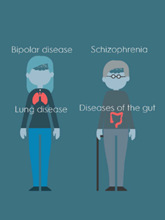Verhoogd risico op ontwikkelen lichamelijke ziektes bij mensen met psychische stoornissen

Mensen met psychische stoornissen hebben een verhoogde kans op het later ontwikkelen van verschillende lichamelijke ziekten, zoals hart- en vaatziekten en een beroerte. Dit blijkt uit een omvangrijke studie gepubliceerd in het toonaangevende New England Journal of Medicine waar de Groningse onderzoekers prof. dr. Peter de Jonge en dr. Annelieke Roest aan meewerkten. Volgens de onderzoekers zijn de resultaten van groot belang omdat psychische stoornissen zich vaker eerder openbaren dan lichamelijke ziekten. Zo kan een psychische stoornis dus een vroegtijdig signaal zijn om iemand actief te monitoren om lichamelijke klachten te voorkomen. Voor het onderzoek analyseerden een internationaal onderzoeksteam data van meer dan 5,9 miljoen Denen die tussen 2000 en 2016 gevolgd zijn op de aanwezigheid van psychische stoornissen en lichamelijke ziekten.
Tussen 2000 en 2016 werden ruim 5,9 miljoen Denen gevolgd op de aanwezigheid van 10 groepen van psychische stoornissen en 9 categorieën van lichamelijke ziekten (31 specifieke ziekten). Vervolgens onderzocht het internationale onderzoeksteam of de psychische stoornissen het risico op de later optredende lichamelijke ziekten verhogen, rekening houdend met factoren zoals leeftijd en geslacht. Prof. dr. Peter de Jonge en dr. Annelieke Roest beide verbonden aan de afdeling Ontwikkelingspsychologie van de Rijksuniversiteit van Groningen maakten deel uit van het onderzoeksteam.
Een veelheid aan specifieke verbanden
In totaal bleken 698.874 van de 5.940.299 personen (11,8%) last te hebben gehad van een psychische stoornis. Voor 76 van de 90 onderzochte paren van psychische stoornissen en latere lichamelijke ziekten werd een verhoogd risico gevonden. De mediane hazard ratio voor een associatie was 1,37, dat wil zeggen dat mensen met een psychische stoornis 37% meer kans hadden op een latere lichamelijke ziekte. Volgens hoogleraar Peter de Jonge laat de studie een schat aan informatie zien over een veelheid aan specifieke verbanden. “Er werd bijvoorbeeld gevonden dat vrouwen met een angststoornis 50% meer kans hebben op het ontwikkelen van hart- en vaatziekten of beroerte. In 15 jaar tijd zal maar liefst 1 op de 3 vrouwen met een angststoornis een van deze lichamelijke ziekten krijgen. Een ander voorbeeld is het verband bij mannen met alcohol-gerelateerde stoornissen, die een 4 keer verhoogd risico hebben op het ontwikkelen van maag-, darm- en leverziekten en in 15 jaar tijd krijgt 1 op de 5 een van deze ziekten.”
Psychische stoornissen als signaal voor verhoogd risico lichamelijke ziekte
De resultaten zijn van groot belang vooral gezien de veelal veel eerdere manifestatie van psychische stoornissen dan lichamelijke ziekten. Veel psychische stoornissen kunnen als signaal worden gezien dat er een verhoogd risico is op een latere lichamelijke ziekte en een escalatie van comorbiditeit, die mogelijk nog te voorkomen is. Mensen zouden bijvoorbeeld gemonitord kunnen worden, en daarbij gescreend worden op bepaalde lichamelijke ziekten. Hierbij valt bijvoorbeeld te denken aan het vaker controleren van bloeddruk en cholesterolwaarden door de huisarts bij bepaalde groepen van patiënten.
Het bestuderen en behandelen van lichamelijke en psychische stoornissen in een levensloopperspectief zou op deze manier een gunstig effect kunnen hebben op zowel de fysieke als geestelijke kwaliteit van leven van mensen. Daarnaast past het onderzoek in de visie om bij het ontstaan van lichamelijke ziekten niet alleen de fysiologie te bestuderen, maar –net als bij de huidige COVID-19 pandemie – de psychologische en gedragsmatige risicofactoren erbij te betrekken.
Open science
In het artikel ‘Association between Mental Disorders and Subsequent Medical Conditions’ dat deze week verscheen in het New England Journal of Medicine, worden niet alleen de belangrijkste resultaten van het onderzoek vermeld maar wordt ook naar een interactieve website verwezen met alle onderzoeksdata. De Jonge: “Het onderzoek is een van de omvangrijkste en meest veelomvattende op dit gebied en sluit goed aan bij het principe van ‘open science’ waardoor onderzoekers en medici de veelheid aan informatie die dit project heeft voortgebracht tot in detail zelf kunnen bestuderen. Bijvoorbeeld, is het risico op een beroerte voor mannen met depressie verhoogd? Of, hoe hoog is het risico dat een vrouw met een ontwikkelingsstoornis over 15 jaar een neurologische ziekte ontwikkelt?”
Meer informatie:
- Prof. dr. P. (Peter) de Jonge, hoogleraar Ontwikkelingspsychologie
- Interactieve website met onderzoeksdata: https://como-gmc.cpsievert.me/
- Association between Mental Disorders and Subsequent Medical Conditions, N Engl J Med 2020;382:1721-31 / DOI: 10.1056/NEJMoa1915784
Meer nieuws
-
17 februari 2026
Van ghostbuster tot rampenonderzoeker
-
03 februari 2026
‘Daar zit een goeie kop op’
-
20 januari 2026
Alcohol, appen en e-bikes
